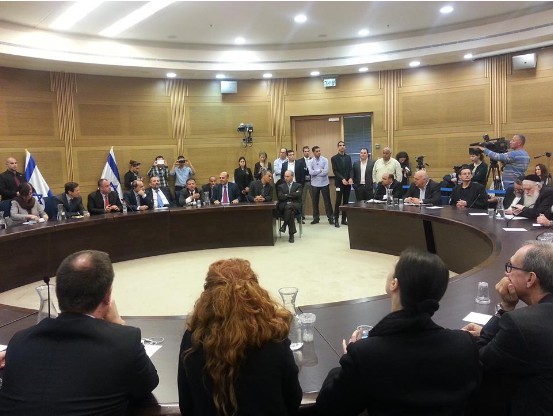Last week’s Knesset debates occurred in the shadow of the opposition’s boycott of the coalition. For the opposition, the breaking point came on March 9, when it was revealed that there was a Document of Understanding between the heads of all the coalition factions. They made a commitment in this document to support all three anti-democratic laws as a single corpus and enforce ironclad party discipline in the ensuing votes. This involved very weighty laws by any criteria: the Sharing the Burden Law, the Governability Law (that included raising the electoral threshold), which was considered a banner piece of legislation by the Chairman of Yisrael Beitenu Avigdor Liberman; and the Referendum Law, which was propelled forward by extreme-right Minister of Economy and Trade Naftali Bennett and other Knesset members from the right. The third law requires that a referendum be held before Israel “withdraws from any land.” It is intended to make it more difficult to reach a peace agreement with the Palestinians.
As far as the heads of the opposition were concerned, it was a move that obligated them to break all the rules and overturn the board. They gathered on March 9 at the Labor Party headquarters in Tel Aviv in an atmosphere of tangible urgency and decided to boycott any votes on these laws. Their intention was that with the Knesset chamber being half empty and with zero votes opposing these laws, they would be sending the public a message. Dov Khenin (Hadash), an outstanding and experienced parliamentarian and a the leader of the boycott, what the opposition got out of this move, and whether he and his colleagues did not violate their commitment to their constituents. Khenin argued in response to journalists that they had no choice. He compared the situation in the Knesset to the political situation in Italy in 1924, saying, “Then the democratic members of parliament withdrew, leaving just Mussolini and his colleagues because of the draconian laws.”
According to Khenin, “That’s what we did now. They confiscated whatever tools we had to fight those laws, and they didn’t even give us an opportunity to explain our reasoning, because it really is impossible to hold a serious discussion about three laws in just three days. It is true that the result is the same, but we proved that we are a unified bloc. We took a drastic step to underscore the fact that we will not be extras [non-existing players] in this undemocratic game.”



